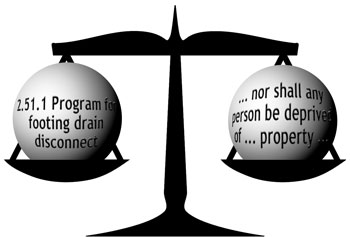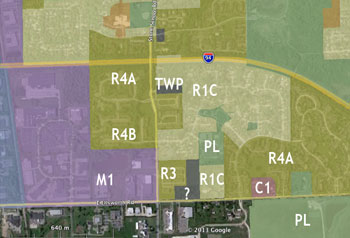Lawsuit Filed on City Footing Drain Program
A lawsuit has now been filed in Washtenaw County’s 22nd Circuit Court challenging the legal foundation of the city of Ann Arbor’s footing drain disconnection (FDD) ordinance.

A lawsuit has been filed in the 22nd Circuit Court challenging the constitutionality of the city of Ann Arbor’s footing drain disconnection program. (Illustration by The Chronicle.)
The ordinance was enacted in 2001. It establishes a program under which property owners can be required to disconnect their footing drains from the sanitary sewer system. Its intent is to diminish the risk of sanitary overflows into the Huron River and of sanitary sewage backups in homeowners’ basements.
In connection with that lawsuit, a motion for a preliminary injunction has also been filed, asking that the court order the city immediately to stop enforcement of its ordinance.
[FDDP-Complaint-Feb.27.2014-OCR] [FDDP-Motion-Feb.27.2014-OCR]
In September 2012, the Ann Arbor city council already took action partially to suspend the FDD program. That council decision of nearly 18 months ago came not in response to a formal legal action, but rather coincided with complaints from residents in the southeastern part of the city.
Then about a year ago, in February 2013, the city authorized a contract with an engineering firm to undertake a sanitary sewer wet weather evaluation (SSWWE) – in part to determine the impact of the FDD program to date. At a public meeting on the SSWWE held two weeks ago, on Feb. 6, 2014, the future status of the FDD program was portrayed as dubious: Even if the SSWWE study eventually identified an ongoing risk of sewage backups in Ann Arbor basements, the FDD would probably not continue “as is.”
The lawsuit claims the city’s FDD ordinance violates: (1) the Michigan state law setting forth the requirements for a government to take private property for public use; (2) the Michigan state constitutional prohibition against taking private property for public use without just compensation; (3) the corresponding U.S. constitutional prohibition against taking private property, which is a Fifth Amendment claim; and (4) the prohibition against violating the federally protected rights of others, which is a claim under 42 U.S.C. Section 1983.
The lawsuit asks that the court declare the FDD ordinance is “unconstitutional, on its face and as implemented.”
Plaintiffs in the case are Ann Arbor residents John Boyer, Mary Jean Raab and Anita Yu. They are represented by attorneys Dan O’Brien, who’s chair of the litigation department at Woods Oviatt Gilman in Rochester, New York; Irvin Mermelstein, a local Ann Arbor attorney in private practice; and Mark Koroi, a Plymouth attorney.
Background leading up to the filing, as well as a description of the filing, has been tracked on a2underwater.com. Mermelstein is the resident agent for a2underwater, LLC.
The lawsuit was filed on Feb. 27, 2014. It has been assigned to judge Donald Shelton.
Some of the legal theories on which the lawsuit is based have already surfaced in correspondence that’s become public. And some aspects of the city’s potential defense against a lawsuit may have already been described publicly by assistant city attorney Abigail Elias. That description came at a recent meeting of a citizens advisory committee that is supposed to make a recommendation sometime in the summer of 2014 on the future of the FDD program. For additional background on the topic of the footing drain disconnection program, see Chronicle coverage: “Backups: Lawyers, Sewers, Pumps.” [Full Story]




